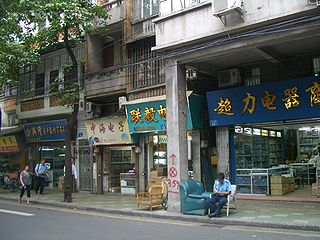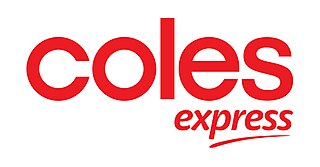Related Research Articles

A debit card, also known as a check card or bank card, is a payment card that can be used in place of cash to make purchases. The card usually consists of the bank's name, a card number, the cardholder's name, and an expiration date, on either the front or the back. Many of the new cards now have a chip on them, which allows people to use their card by touch (contactless), or by inserting the card and keying in a PIN as with swiping the magnetic stripe. These are similar to a credit card, but unlike a credit card, the money for the purchase must be in the cardholder's bank account at the time of the purchase and is immediately transferred directly from that account to the merchant's account to pay for the purchase.

Electronic funds transfer at point of sale is an electronic payment system involving electronic funds transfers based on the use of payment cards, such as debit cards or credit cards, at payment terminals located at points of sale. EFTPOS technology was developed during the 1980s.

An automated teller machine (ATM) is an electronic telecommunications device that enables customers of financial institutions to perform financial transactions, such as cash withdrawals, deposits, funds transfers, balance inquiries or account information inquiries, at any time and without the need for direct interaction with bank staff.

A transaction account, also called a checking account, chequing account, current account, demand deposit account, or share draft account at credit unions, is a deposit account or bank account held at a bank or other financial institution. It is available to the account owner "on demand" and is available for frequent and immediate access by the account owner or to others as the account owner may direct. Access may be in a variety of ways, such as cash withdrawals, use of debit cards, cheques and electronic transfer. In economic terms, the funds held in a transaction account are regarded as liquid funds. In accounting terms, they are considered as cash.

Business-to-business is a situation where one business makes a commercial transaction with another. This typically occurs when:
A chargeback is a return of money to a payer of a transaction, especially a credit card transaction. Most commonly the payer is a consumer. The chargeback reverses a money transfer from the consumer's bank account, line of credit, or credit card. The chargeback is ordered by the bank that issued the consumer's payment card. In the distribution industry, a chargeback occurs when the supplier sells a product at a higher price to the distributor than the price they have set with the end user. The distributor submits a chargeback to the supplier so they can recover the money lost in the transaction.

Payment cards are part of a payment system issued by financial institutions, such as a bank, to a customer that enables its owner to access the funds in the customer's designated bank accounts, or through a credit account and make payments by electronic transfer with a payment terminal and access automated teller machines (ATMs). Such cards are known by a variety of names, including bank cards, ATM cards, client cards, key cards or cash cards.

World Kinect Corporation, formerly known as World Fuel Services Corporation, is an energy, commodities, and services company based in Doral, Florida. The company ranked No. 70 in the 2022 Fortune 500 list of the largest United States corporations. WKC focuses on the marketing, trading, and financing of aviation, marine, building, and ground transportation energy commodities and related services. As of 2013, WKC also operates in natural gas and power.

Coles Express is an Australian chain of convenience stores at Shell Australia petrol stations. Until it became controlled by Viva Energy in May 2023, Coles Express was a trading name of Coles Group.

A fuel card or fleet card is used as a payment card most commonly for gasoline, diesel, and other fuels at gas stations. Fleet cards can also be used to pay for vehicle maintenance and expenses at the discretion of the fleet owner or manager. Most fuel cards are charge cards.
National Benzole was a petroleum brand used in the United Kingdom from 1919 to the 1990s. In 1957, the National Benzole Co. became wholly owned by Shell-Mex & BP but continued its separate trading identity. In the early 1960s, National Benzole was re-branded as National and continued trading as a UK retailer of petroleum products until the early 1990s, when the brand was phased out by parent company, BP.

National Financial Switch (NFS) is the largest network of shared automated teller machines (ATMs) in India. It was designed, developed and deployed by the Institute for Development and Research in Banking Technology (IDRBT) in 2004, with the goal of inter-connecting the ATMs in the country and facilitating convenience banking. It is run by the National Payments Corporation of India (NPCI). As on 31st January’ 22, there were 1,203 members that includes 111 Direct, 1,045 Sub members, 43 RRBs and 4 WLAOs using NFS network connected to more than 2.55 Lac ATM (including cash deposit machines/recyclers).
Fuel-management systems are used to maintain, control and monitor fuel consumption and stock in any type of industry that uses transport, including rail, road, water and air, as a means of business. Fuel-management systems are designed to effectively measure and manage the use of fuel within the transportation and construction industries. They are typically used for fleets of vehicles, including railway vehicles and aircraft, as well as any vehicle that requires fuel to operate. They employ various methods and technologies to monitor and track fuel inventories, fuel purchases and fuel dispensed. This information can be then stored in computerized systems and reports generated with data to inform management practices. Online fuel management is provided through the use of web portals to provide detailed fueling data, usually vis a vis the back end of an automated fuel-management system. This enables consumption control, cost analysis and tax accounting for fuel purchases.

Credit card fraud is an inclusive term for fraud committed using a payment card, such as a credit card or debit card. The purpose may be to obtain goods or services or to make payment to another account, which is controlled by a criminal. The Payment Card Industry Data Security Standard is the data security standard created to help financial institutions process card payments securely and reduce card fraud.

A credit card is a payment card, usually issued by a bank, allowing its users to purchase goods or services or withdraw cash on credit. Using the card thus accrues debt that has to be repaid later. Credit cards are one of the most widely used forms of payment across the world.

Pay at the pump is a system used at many filling stations, where customers can pay for their fuel by inserting a credit card, debit card, or fuel card into a slot on the pump, bypassing the requirement to make the transaction with the station attendant or to walk away from one's vehicle. A few areas have gas stations that use electronic tolling transponders as a method of payment, such as Via Verde in Portugal.
DAT Freight & Analytics, originally known as Dial-a-Truck, is a US-based freight exchange service and provider of transportation information serving North America. Freight exchange services are used to match material ("loads") that needs to be shipped with over-the-road carriers, which can be hired to move those loads. DAT was established in 1978 and is part of Roper Technologies. It is co-headquartered in Denver, Colorado and Beaverton, Oregon. Satish Maripuri, President and CEO, is responsible for DAT’s strategy and execution.
A vehicle tracking system combines the use of automatic vehicle location in individual vehicles with software that collects these fleet data for a comprehensive picture of vehicle locations. Modern vehicle tracking systems commonly use GPS or GLONASS technology for locating the vehicle, but other types of automatic vehicle location technology can also be used. Vehicle information can be viewed on electronic maps via the Internet or specialized software. Urban public transit authorities are an increasingly common user of vehicle tracking systems, particularly in large cities.

A gasoline pump or fuel dispenser is a machine at a filling station that is used to pump gasoline (petrol), diesel, or other types of liquid fuel into vehicles. Gasoline pumps are also known as bowsers or petrol bowsers, petrol pumps, or gas pumps.

Corpay, Inc. is a global business payments and spend management company that provides solutions that control expense-related purchasing and payment processes. Corpay is an S&P 500 company with a portfolio of brands that automate, secure, digitize and manage billions of payment transactions annually on behalf of businesses across more than 100 countries in North America, Latin America, Europe, and Asia-Pacific.
References
- ↑ "Fuel Solutions". Jubitz Fleet Services. Jubitz Corporation. Archived from the original on September 25, 2013. Retrieved May 22, 2012.
- ↑ "About Lakeview Petroleum". Lakeview Petroleum Company. Pacific Pride. Retrieved May 22, 2012.
- ↑ "Pacific Pride Cardlock | Fuel Security | Prevent Fuel Theft | Star Oilco". www.staroilco.net. Retrieved July 31, 2017.
- "Pacific Pride Services, Inc. and FleetMan, Inc. d/b/a Fuelman Announce Intent to Provide Customers Mutual Access to Sites Carrying Pacific Pride and Fuelman Marks". Fleet Equipment. September 1, 2000. Retrieved July 24, 2008.
- "Market Report -- In Play (WXS). Wright Express to acquire certain assets of Pacific Pride Services for approximately $32 mln; expected to be accretive on a non-GAAP basis in 2008". Briefing.com via MSN Money. February 6, 2008. Archived from the original on July 3, 2007. Retrieved July 24, 2008.